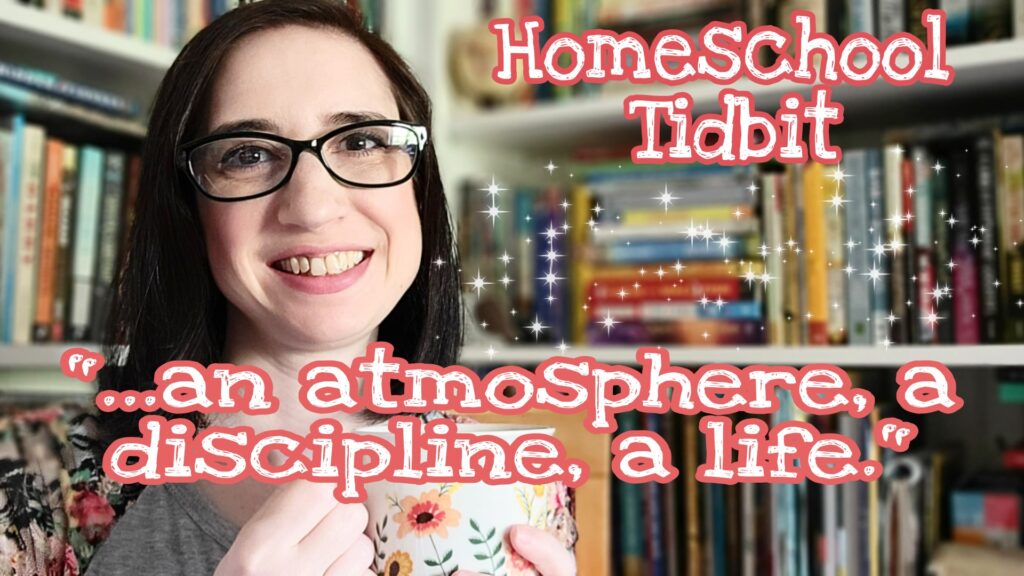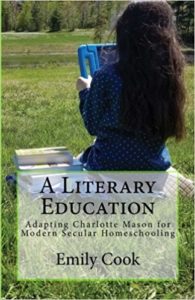Homeschool Tidbits: “An Atmosphere, a Discipline, a Life.”
May 6, 2022
 Welcome to Build Your Library’s “Homeschool Tidbits: Episode 16 – “An Atmosphere, a Discipline, a Life…”. In this weekly video series, I will delve briefly into a topic related to homeschooling and will share some of my knowledge and expertise as a long-time homeschooling mother of 4 children. Three of whom have graduated!
Welcome to Build Your Library’s “Homeschool Tidbits: Episode 16 – “An Atmosphere, a Discipline, a Life…”. In this weekly video series, I will delve briefly into a topic related to homeschooling and will share some of my knowledge and expertise as a long-time homeschooling mother of 4 children. Three of whom have graduated!
Today I want to dive back into our Charlotte Mason discussion. One of Miss Mason’s most famous mottos is “Education is an atmosphere, a discipline, a life.” This quote sums up her entire philosophy. I thought it deserved its very own tidbit to talk about what it actually means, and how you can incorporate it into your homeschool.
Education is an Atmosphere.
What do you think of when I say atmosphere? Do you think of the air around you? That’s what we want education to be, something our children are breathing in daily. We want to build a home for our children that will immerse them in learning. At times, without them even noticing that is what they are doing.
Maybe the word atmosphere in regards to education makes you picture a physical classroom, but that isn’t what I’m talking about. Building an atmosphere of education in your home encompasses the total encouragement of learning. It means reading together regularly. It means talking about anything and everything. Encouraging your child to ask questions and then seek out the answers. It means letting them make mistakes, letting them explore, and even get dirty. When you give your children this freedom, learning becomes second nature. They do it without even realizing it, just like breathing.
A huge benefit of homeschooling is that we are able to take our children into the world much more frequently. We can go explore museums, historical sites, and state parks. We can talk to people out there doing work in those places. People tend to imagine homeschoolers as being reclusive, hiding their children away from the world, but the reality is quite the opposite!
We aren’t trying to replicate a traditional classroom experience at home. Rather, we want to bring things into our home that inspire learning. Books, art, and nature all have an important place in our overall atmosphere of learning. We don’t need desks, whiteboards, numerous educational posters, and a lecturing teacher. Instead, we should consider what our children love, and what they are inspired by, and fill our homes with that.
“By the saying, Education is an atmosphere, it is not meant that a child should be isolated in what may be called a ‘child environment,’ especially adapted and prepared; but that we should take into account the educational value of his natural home atmosphere, both as regards persons and things, and should let him live freely among his proper conditions. It stultifies a child to bring down his world to a ‘child’s’ level.” ~ Charlotte Mason
Education is a Discipline.
Habits. We want to encourage our children in good habits that will help them in life. This is what Charlotte Mason is talking about when she says that education is a discipline. We must help our children (and ourselves) form good habits. I once read that if you do something for 21 days in a row it will become a habit. I know it’s easy to let bad habits form, like scrolling my phone mindlessly or ignoring my messy kitchen so I can watch one more episode of a show on Netflix. But good habits can be just as easy.
So how can we encourage good habits in our children? There are obvious habits, like tooth brushing and basic hygiene that we want our children to have. But why not also make daily reading a habit? Or the habit of observation, for example. When you are outside, are you looking carefully at the world around you? Or are you distracted? Charlotte Mason wanted children to learn to carefully observe the world around them. That’s why she encouraged nature study! It’s not just about backyard science. It’s about honing a skill, learning to really look at something, and sitting quietly for a few minutes while you do.
There are many habits that we can teach our children that will be of use in their adult lives. We can teach them to be punctual by having a regular start time for our homeschool routine. We can teach our children the habit of neatness by doing regular copywork. We can teach them to be attentive by concentrating on short lessons and encouraging narration.
Of course, we want to teach them the habit of reading. The best way to encourage these habits is by doing them ourselves. We must be mentors to our children. If you want them to learn the habit of punctuality, but you are always running late, it’s simply not going to work. We must make these habits a priority in our own lives and then demonstrate to our children why they are important.
“The discipline of habit is at least a third part of the great whole which we call education.” ~ Charlotte Mason
Education is a Life.
Charlotte Mason believed that education was a living thing. She also said that our minds need ideas to thrive. Education is about feasting on ideas. One of the most important aspects of a Charlotte Mason education is that we don’t spoon-feed our children information. Rather, we give them ideas to ponder. And the vehicle for this is living books. Through living books, written by a passionate author, written in narrative form, we can endlessly feed our children’s minds.
We want them to think deeply about things and make their own connections. We read together, and we encourage them to read independently. We talk about what we read, we maintain a timeline or Book of Centuries to help see the scope of history in a more concrete way. We keep a nature journal and work at the skill of careful observation while also learning about all the flora and fauna in our own backyard. We look at great art and listen to a wide range of music. We read poetry and Shakespeare. We enhance our math studies with manipulatives, games, and living math books.
Our children’s education should be rich with ideas. That is the only way to make information stick! Children who are only fed lists of facts through dull textbooks will remember those facts just long enough to pass a test. But children taught with living books, books teeming with ideas, that is the kind of learning that sticks around long after.
“In the early years of the child’s life it makes, perhaps, little apparent difference whether his parents start with the notion that to educate is to fill a receptacle, inscribe a tablet, mold plastic matter, or nourish a life; but in the end we shall find that only those ideas which have fed his life are taken into the being of the child; all the rest is thrown away, or worse, is like sawdust in the system; an impediment and an injury to the vital processes.” ~ Charlotte Mason
Coming up next…
I hope you found this Tidbit helpful! Come back next week for more homeschooling inspiration!
Until then, happy reading!
See Also:
Charlotte Mason in the Secular Homeschool
A Literary Education book
About Build Your Library
Homeschool Tidbits: Build Your Library’s Weekly Video Blog Series
 Emily Cook is the author and creator of the secular homeschool curriculum Build Your Library, a literature-based K-12 program infused with the teachings of Charlotte Mason. She writes full-year lesson plans as well as shorter topical unit studies. Emily has been homeschooling her four children in Southern NH for 21 years. She is passionate about reading aloud to children of all ages and loves to share her love of literature with others. She and her family also make incredibly dorky videos about homeschooling, books, and more on Youtube at ARRRGH! Schooling. You can follow her on Facebook, Twitter, and Pinterest. You can also check out her author page on Amazon.
Emily Cook is the author and creator of the secular homeschool curriculum Build Your Library, a literature-based K-12 program infused with the teachings of Charlotte Mason. She writes full-year lesson plans as well as shorter topical unit studies. Emily has been homeschooling her four children in Southern NH for 21 years. She is passionate about reading aloud to children of all ages and loves to share her love of literature with others. She and her family also make incredibly dorky videos about homeschooling, books, and more on Youtube at ARRRGH! Schooling. You can follow her on Facebook, Twitter, and Pinterest. You can also check out her author page on Amazon.
